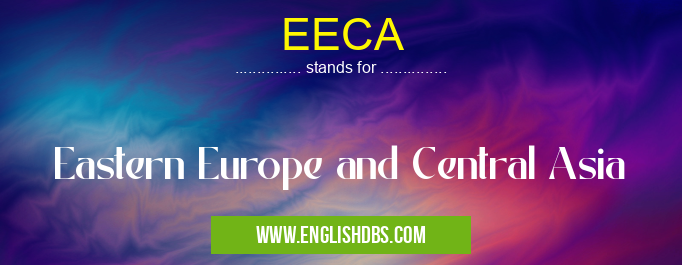What does EECA mean in EUROPEAN
EECA stands for Eastern Europe and Central Asia. It is a region that encompasses countries in the eastern part of Europe and the central part of Asia. The region is home to a diverse range of cultures, languages, and religions.

EECA meaning in European in Regional
EECA mostly used in an acronym European in Category Regional that means Eastern Europe and Central Asia
Shorthand: EECA,
Full Form: Eastern Europe and Central Asia
For more information of "Eastern Europe and Central Asia", see the section below.
EECA Meaning in Regional
The term EECA is commonly used in international development and diplomacy to refer to the region of Eastern Europe and Central Asia. It is a term that is used to describe the region's unique geopolitical and economic characteristics.
EECA Full Form
Eastern Europe and Central Asia (EECA)
What does EECA Stand for?
The acronym EECA stands for the following:
- Eastern Europe
- Central Asia
Essential Questions and Answers on Eastern Europe and Central Asia in "REGIONAL»EUROPEAN"
What is the EECA region?
EECA stands for Eastern Europe and Central Asia, a region composed of 29 countries that formerly belonged to the Soviet Union and the socialist bloc in Eastern Europe. The region includes countries such as Russia, Ukraine, Poland, Kazakhstan, and Uzbekistan.
What are the economic characteristics of the EECA region?
The EECA region is characterized by a mix of developed and developing economies. Russia is the largest economy in the region, followed by Ukraine and Poland. The region has a rich endowment of natural resources, including oil, gas, and minerals. However, it also faces challenges such as corruption, political instability, and weak institutions.
What are the political challenges facing the EECA region?
The EECA region has faced numerous political challenges since the collapse of the Soviet Union. Many countries in the region have been grappling with issues such as:
- Democratic transitions
- Ethnic conflicts
- Border disputes
- Corruption and organized crime
What is the role of international organizations in the EECA region?
International organizations such as the United Nations, the World Bank, and the European Union play a significant role in the EECA region. These organizations provide financial assistance, technical expertise, and support for political reforms. They also help to promote regional cooperation and security.
What are the prospects for the EECA region?
The prospects for the EECA region are mixed. The region has the potential to become a major economic and political player, but it also faces significant challenges. The future of the region will depend on its ability to address these challenges and take advantage of its opportunities.
Final Words: The EECA region is a complex and diverse region with a rich history and culture. It is a region that is undergoing significant economic and political change. The term EECA is a useful tool for understanding the region and its challenges and opportunities.
